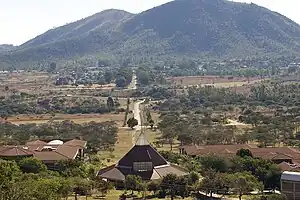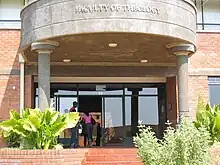 | |
| Motto | Investing in Africa's Future |
|---|---|
| Type | Private |
| Established | 1992 |
Religious affiliation | United Methodist Church |
| Chancellor | Bishop Gaspar João Domingos |
| Vice-Chancellor | Rev. Professor. Peter. Mageto |
Administrative staff | 250 |
| Students | 1,300 |
| Location | Mutare (Old Mutare) , , |
| Campus | Rural, 1,545 acres (625 ha) |
| Nickname | Acacians |
| Website | www |
Africa University is a "private, Pan-African and United Methodist-related institution." It has over 1,200 students from 36 African countries.[1] It is located 17 km northwest of Mutare, Zimbabwe in Penhalonga. It grants bachelor's, master's and PhD degrees in various programs.
History

Africa University is a private, Pan-African institution of higher learning located in Mutare, Zimbabwe. It was founded in 1992 and is the first private university in Zimbabwe. Africa University's mission is to "train leaders who will make a positive difference in their communities and countries."
Africa University offers a range of undergraduate and postgraduate programs in a variety of disciplines, including agriculture, business, education, engineering, health sciences, humanities, and social sciences. The university has a focus on research and innovation, and its faculty and staff are drawn from all over Africa and the world.
Africa University is a highly respected institution in Africa and around the world. It is known for its academic excellence, its commitment to diversity, and its focus on leadership development. Africa University's graduates have gone on to hold positions of leadership in business, government, education, and the church throughout Africa.
Here is a timeline of some of the key events in the history of Africa University:
- 1980: African Bishops of the United Methodist Church (UMC) begin to advocate for a university that would serve the entire continent.
- 1985: The UMC's General Conference approves the "Africa Initiative," which calls for the establishment of a Pan-African university.
- 1991: The UMC purchases a 1,500-acre farm near Mutare, Zimbabwe, as the site for the new university.
- 1992: The Africa University Charter is issued by the President of Zimbabwe on January 21, 1992, making it the first recognized private university in Zimbabwe.
- 1992: Africa University opens its doors to its first students in September 1992, with an initial enrollment of 163 students from 16 African countries.
- 2008: Professor Munashe Furusa is elected vice-chancellor of Africa University.
- 2023: Africa University is a thriving institution with over 3,000 students enrolled in its programs. The university offers a wide range of undergraduate and postgraduate programs, and its graduates are making a positive difference in their communities and countries throughout Africa.
Africa University is a significant institution in the African higher education landscape. It is a private, Pan-African university that is committed to providing quality education within a Pan-African context.
Funding

Funding for Africa University is a two-part $20 million effort every four years. Ten million is apportioned to the 34,000+ United Methodist churches. The apportioned dollars provide for the day-to-day operating expenses of the university. The second ten million is raised through World Service Special Gifts for a permanent endowment. The interest and earnings on the permanent endowment provide scholarships and other financial aid for students as well as meet new and emerging programmatic needs of the university.
The Africa University Development Office located in Nashville, Tennessee,[4] has the primary responsibility to raise funds for the permanent endowment as well as for capital projects. James H. Salley is the Associate Vice-Chancellor for Institutional Advancement and has supervisory responsibility for the Nashville office.
Structure
A 30-member board of directors chaired by Bishop Marcus Matthews governs Africa University. A founding member of Africa University's Faculty of Theology was elected the university's third chancellor on 8 December 2008. Professor Fanuel Tagwira, another founding member of the university's Faculty of Agriculture, was elected the university's third vice-chancellor in March 2009. As of 1 July 2014, Prof Munashe Furusa was unanimously elected as the new vice-chancellor.
Africa University is the first private, fully accredited, degree-granting United Methodist-related institution of higher learning on the continent of Africa as established and approved by General Conference. The university is Pan-African in design and spirit. Thirty six nations of Africa were represented in the student population for the 2015/2016 academic year. The majority of faculty and administrative staff are Africans. Professors and policy makers comprise permanent and visiting educators from the United States, Europe, and around the world. The official language at the university is English, which is also the official language of Zimbabwe.

There are thirty-two buildings on the campus with four currently under construction. The 32 buildings include 12 dormitories, 12 senior staff housing units, a chapel, and a state-of-the-art library complex. The four buildings under construction include a student clinic, two housing duplexes for senior staff, and the building for the Institute of Peace, Leadership, and Governance (IPLG).
Recently the Kent M. Weeks Archives[5] was opened to collect all university and United Methodist Church records which are deemed to be of historic and research value.
Academics

There are currently 3 colleges at Africa University, namely the College of Health, Agriculture and Natural Sciences; the College of Business, Peace, Leadership and Governance; and the College of Social Sciences, Theology, Humanities and Education.[7] Plus the School of Law. There is also the Africa University Information Technology Training Center.[8]
College of Health, Agriculture and Natural Sciences
The Department of Agriculture and Natural Sciences offers a Bachelor of Science and Master of Science degrees in Agriculture and Natural Resources.
The Department of Health Sciences offers undergraduate degrees in nursing and health science management and a master's degree in public health.
College of Business, Peace, Leadership and Governance
- Business[11]
- Computer Science and Information Systems
- Institute of Peace, Leadership and Governance
The Department of Business offers a number of training options for those interested in careers in business development and management, marketing, finance, and administration. At the undergraduate level, it has a full-time 4-year programme leading to degrees in accounting, economics, and management, marketing and computer science. It offers a full-time 2-year MBA program and a part-time EMBA program for senior managers and administrators.https://executivemba.wharton.upenn.edu/mba-or-emba/
The Institute of Peace, Leadership and Governance (IPLG) is a graduate institute which offers master's degrees in peace and governance, public policy and governance, Human rights law, Migration law and a Masters in intellectual property law. It also offers a PhD in Peace Leadership and Governance. It also offers trainings and short courses for lawyers, civil servants and policy makers. It has various partners including World Intellectual property organization (WIPO) and the Open Society Initiative in Southern Africa (OSISA)
College of Social Sciences, Theology, Humanities and Education

The Departments of Humanities and Social Sciences offer three- and four-year full-time degree programs, in the form of either a Bachelor of Arts or Bachelor of Social Sciences with specialisation in English, Environmental Studies, French, History, Music, Portuguese, Psychology, Sociology, or Religious Studies. Two master's degrees are offered in child and family studies.
The Department of Theology offers a four-year full-time Bachelor of Divinity degree and a two-year full-time Master of Theological Studies degree.
The Department of Education offers a four-year full-time Bachelor of Arts degree and a two-year Bachelor of Education degree for secondary school teachers. The two-year program is specifically designed for teaching professionals who wish to upgrade their skills.
Notable alumni
- Charles Charamba, gospel musician, pastor, songwriter, producer
- Herbert Gomba, former mayor of the City of Harare
- Chido Govera, farmer, campaigner, and educator
- Dr. Tonderai Kasu, substantive director of health and environmental services for Chitungwiza and former acting town clerk (acting chief executive) for Chitungwiza Town Council
- Michele Young-Stone, American novelist
References
- ↑ "Welcome to Africa University Main Page". Africau.edu. 28 June 2010. Archived from the original on 19 August 2010. Retrieved 5 September 2010.
- ↑ Embleton, Lonnie; Ayuku, David; Kamanda, Allan; Atwoli, Lukoye; Ayaya, Samuel; Vreeman, Rachel; Nyandiko, Winstone; Gisore, Peter; Koech, Julius; Braitstein, Paula (1 April 2014). "Models of care for orphaned and separated children and upholding children's rights: cross-sectional evidence from western Kenya". BMC International Health and Human Rights. 14 (1): 9. doi:10.1186/1472-698X-14-9. ISSN 1472-698X. PMC 4021203. PMID 24685118.
- ↑ "Brief History - Africa University Development Office". www.support-africauniversity.org. Archived from the original on 8 January 2017. Retrieved 15 May 2022.
- ↑ "Africa University Development Office". Support Africa University. 23 July 2010. Archived from the original on 17 October 2010. Retrieved 5 September 2010.
- ↑ "Africa University Archives". Africauarchives.synthasite.com. Archived from the original on 22 May 2019. Retrieved 5 September 2010.
- ↑ "Africa University Archives". Africauarchives.synthasite.com. Archived from the original on 16 July 2011. Retrieved 5 September 2010.
- ↑ "Institute of Peace Leadership and Governance". Africau.edu. 23 August 2007. Archived from the original on 16 November 2009. Retrieved 5 September 2010.
- ↑ "Information Technology Training Center". Africau.edu. 26 November 2007. Archived from the original on 26 January 2010. Retrieved 5 September 2010.
- ↑ "Africa University::Agriculture". Africau.edu. 24 August 2007. Archived from the original on 24 August 2010. Retrieved 5 September 2010.
- ↑ "Faculty of Health Sciences". Africau.edu. 24 August 2007. Archived from the original on 25 August 2010. Retrieved 5 September 2010.
- ↑ "Management & Administration". Africau.edu. 11 February 2009. Archived from the original on 18 June 2009. Retrieved 5 September 2010.
- ↑ "Africa University :Administration". Africau.edu. 11 February 2009. Archived from the original on 11 January 2010. Retrieved 5 September 2010.
- ↑ "Faculty of Theology". Africau.edu. 11 February 2009. Archived from the original on 26 July 2010. Retrieved 5 September 2010.
- ↑ "Africa University Faculty of Education". Africau.edu. 24 August 2007. Archived from the original on 22 August 2010. Retrieved 5 September 2010.
External links
- Official Web Site of Africa University
- Official Web Giving Site for Africa University
- Africa University partners with Chevron to help the University of Agostinho Neto in Angola
- https://www.mohe.gov.zm/ Archived 9 August 2020 at the Wayback Machine
- https://www.zaqa.gov.zm/higher-education-institutions/ Archived 8 September 2018 at the Wayback Machine
- https://www.hea.org.zm/
